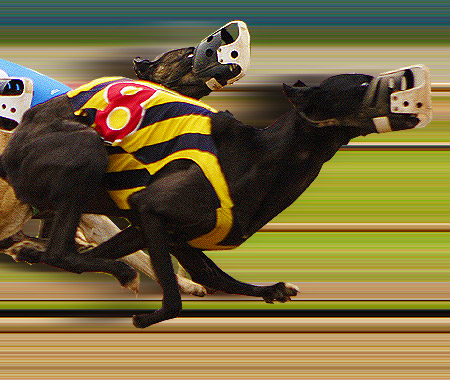What is a Dog Wager?
A Dogwager is a bet placed on the outcome of dog races. These races are run by greyhounds. The dogs chase a mechanical lure, typically an artificial bone, which is traditionally called a hare. The hare is started about half a circuit behind the start. When it passes a point near the starting traps, What is Dogwager?it automatically triggers the gate and releases the dogs. The winner of a dog race is the greyhound whose nose first reaches the winning line. The position of the feet is not taken into account. Dog race finishes are photographed and where the result is close the judge examines the negative or a print before declaring the order of the finish.
Many racetracks offer pari-mutuel dogwagering on live events almost daily. By definition, the term "pari-mutuel" tells the bettor that they bet amongst each other, not against the house. The track merely retains a percentage for handling the wagers. Pari-mutuel tracks make the same percentage regardless if the bettor wins or loses, thus providing a level playing field for all players.
A typical dog wager menu includes the following: win, place, show, exacta, quinella, trifecta, superfecta, daily double, Pick 3 and others - providing a wide variety of wagering options for beginners and seasoned race-goers alike.
Place a wager on your favorite dog now!
Dog Wager Tips
Early Speed / Front Runners. There are two types of early speed dogs. One type shows a strong break out of the box -the break call is approximately four lengths from the starting box. The other type tends to break moderately and then rush or drive the first turn.
Late Speed / Closers. Late speed dogs generally show a somewhat slow break out of the box. They come to the 8th call following the pack. From here on out is where the closers run their race. Some may show a gradual gain throughout the race, while others, which I refer to as drivers, wait until late in the race to make their move. This type of a runner pushes hard in the stretch passing many of the dogs and should never be underestimated.
Class. Determining the class of the race can be tough sometimes. This can depend on the stats you have available to you. Look first to find the one showing the most "in the money" finishes at the current grade racing. Next, look for grade drops and how competitive the dog was in the higher grade. Class tends to be a much stronger variable in higher-grade races.
Time. This variable brings many arguments between handicappers. Some tend to place this factor at the top of the list, while others consider this lightly. Some observers have found a strong correlation with the dogs having the fastest times generally will also be the class of the race.
Heart. This factor can be gauged as seen in our stats. If a dog exhibits heart, he shows the ability and determination to come back after finding trouble. This type of competitor will either finish in the money or make a strong attempt to do so.
Trouble. How many times have you heard "If he wouldn't have gotten into trouble, he could have won." Trouble to me is the toughest variable you will find in handicapping. "It is found in every race." Sometimes with only one or two dogs, but usually several. Coming into the first turn is where most of the trouble occurs. This is where the early speed/front runners can benefit by being out of harms way. The positive aspect of trouble is that it produces the higher payoffs. When selecting your key greyhound in a wager, consider his trouble percentage. If he shows a high percentage of trouble and doesn't seem to benefit by his post-position, look to another greyhound as a key.
Track Preference. Knowing where on the track a dog likes to run can be very important. Out of the starting box, some may reach this area without causing trouble. Others may tend to slash or cut to the rail or outside. A dog that tends to run the rail and is positioned to the right of a mid-track or wide runner may find it hard to make their way around the other. This is true especially if both dogs tend to break the same. Some handicappers will play off this type of a situation, looking to a competitor whose running style and post-position will keep him clear of any possible trouble.
Place a wager on your favorite dog now!



